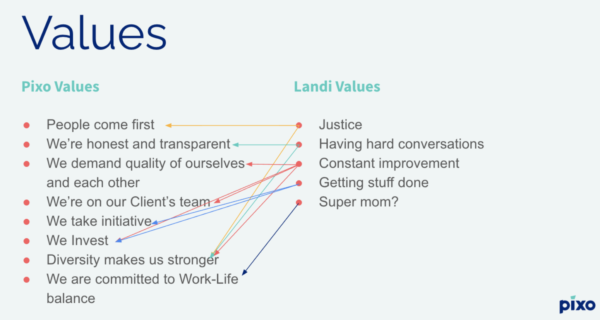Striking a balance between your values and your benefits

Introduction
I was recently a mentor for a software engineering intern. When she began looking for a full-time job, she began asking me questions about how to find a company with a good culture. I hadn’t really thought about that, because I have always been a part of creating the culture here at Pixo. It’s been over nine years since I’ve interviewed at a company, and back then, I didn’t really see the interview as a two-way process. I felt that I was the one needing to prove something to my potential future employer, but it really is an interview in both directions. When looking for a company, it’s equally important to find some place where you don’t have to greatly compromise on your core values to “fit in” or advance.
So, what are your values?
What you value is something that can only be determined by you, based on your beliefs and preferences.
Core values
These things are not very quick to change because they are so deeply ingrained in your life and are a part of what makes you tick.You feel most like yourself when you are living by your core values. These are the “can’t live without” values.
Example core values:
- Honesty – telling the truth, even if it’s difficult
- Empathy – being able to understand the feelings of another person, put yourself in their shoes
- Quality – making sure the things you produce meet some predefined standards
Secondary values
These things can be changed for the right reasons. External influences from the people around us, our environments, and situational challenges can make our secondary values flex to adapt to these influences. These are the “nice to have” values.
Example secondary values:
- Learning – having growth opportunities be prioritized
- Stability – having something that’s not going to change frequently; reliability in routine
- Wealth – having a certain amount of money
These are examples of how values could be classified. Maybe to one person, learning is more important than quality. That is why your values are something that each individual has to figure out for themselves.
Finding alignment
Explore your values and separate the core ones that are your guiding principles from the secondary ones. Research the companies you are interested in and find out what their core values are. If they don’t have core values, that could be telling; ask them why not. See where your values and the company values align or misalign.
This is an example of how my core values sync up to Pixo values:

When you find a company that you feel aligned with
When you find a company that you feel aligned with, ask them questions to see if they are really living their values or giving you canned responses of what they think you want to hear.
If a company says they value People first, ask:
- Are there mentorship opportunities?
- The answer could show what advancement might look like for people at the company
- How often are reviews and what is that process like?
- Feedback that happens more than once a year could help mitigate performance issues before they get out of hand. Is the feedback empowering, encouraging, and honest with the intention of helping you grow?
- How do you measure success for this position?
- If they are unclear what they want from you, how can you meet their expectations?
- How collaborative is the team I will be on and how do you strengthen team bonds?
- Is the culture team-oriented or is it a finger-pointing environment?
- What’s the most challenging client situation you’ve faced this year and how did the company handle it?
- This could highlight how the company treats both internal and external people
If a company says We invest, ask:
- What learning opportunities are available?
- Is there a professional development budget per person?
- How are employees motivated to reach their goals?
- Does this company have 401k matching or a profit-sharing plan?
- What does the turnover rate look like for this position at your company?
If a company says Diversity makes us stronger, ask:
- Do you have a Diversity, Equity, and Inclusion committee?
- Is the company constantly reflecting on how to give voice to their members of various marginalized groups?
- Can you share data on the company’s diversity?
- If they have data readily available, they are thinking about it and probably making a conscious effort to expand the company’s make-up
- How diverse is the leadership team and is there a goal of diversifying by a certain date?
- If leadership isn’t diverse, do they have plans in place to support members of marginalized groups growing into leadership roles?
- How do your recruiting efforts support diversity?
- Are they thoughtful about the language in job descriptions? Do they meaningfully post jobs in places that could attract more diverse candidates? Do recruiters and interviewers allow candidates to use the tools that make them the most comfortable during their interviews?
- What accommodations exist for making sure the work environment is inclusive?
- Are there built-in support structures for people who learn in different ways (like a library of books, videos, classes, etc.)?
- Is there flexibility in work schedules for parents, remote employees, employees who are also students?
- Do they provide resources to help employees be their most productive, like private offices or noise-canceling headphones?
- Are they just checking a box to achieve diversity, or are they making sure that employees have what they need to be successful?
Where are you willing to compromise?
Ok, you’ve found a company whose values appear to align with some or most of your core values! Everything else can be icing on the cake. Does the company meet any of your secondary values? You have to decide which benefits are worth fighting for and which you can loosen up on.
If flexible hours are extremely important to you, then maybe you can sacrifice on a smaller salary to gain that extra flexibility.
Getting what you’re missing
So you’ve acquired the recipe to happiness at work! Well, not quite yet.
Not every one of your values, core or secondary, nicely matches up with a company value. It’s probably not the case for everyone that they find a single company to fulfill every one of their needs. In these cases, look for fulfillment elsewhere.
If constant learning is a “nice to have” for you, and your company doesn’t offer educational stipends or support, see what classes you might be able to take online or at your local college/university. If having a mentor would be useful but your company doesn’t have formal mentoring, get creative. See if you can use your professional development budget to get a senior colleague’s time to get that mentor relationship. Or, see if you can hire a coach or mentor from outside of the company.
You will never know if you don’t ask. Don’t expect someone to meet your needs if you aren’t clear what your needs are. Don’t assume that because there isn’t a formal program in your company handbook that a company wouldn’t be accommodating. Don’t feel like getting your core needs met is “special treatment” but understand that a good company knows that a happy employee does their best work.
Remember, you aren’t just interviewing to see if you are a good fit for a company. You are seeing if the company is a good fit for you, too.